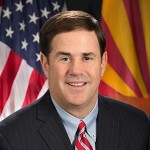
“I’ve been adamant in my commitment to ensuring that all Arizona students have access to the best education possible, regardless of where they live. This bipartisan legislation is a simple but significant step in the right direction,” said Governor Ducey. “I want to thank our legislators, and particularly the bill’s sponsor, Senator Begay, for their commitment to empowering parents, expanding educational opportunities and improving outcomes for all.” The new law gives families on tribal lands, mostly in rural areas, the opportunity to customize their children’s education. Parents can choose how to use their state-funded education accounts and can pay for options like private school tuition, online classes, homeschooling, or other education related expenses.
“We are very thankful to Governor Ducey and the bill sponsor, Senator Carlyle Begay, for their commitment to addressing the long-standing education problems on the state’s reservations,” said Kevin Chavous, executive counsel for the American Federation for Children. “These children have been ignored long enough when it comes to providing them with quality educational options. Today Governor Ducey did his part to right that wrong.”






